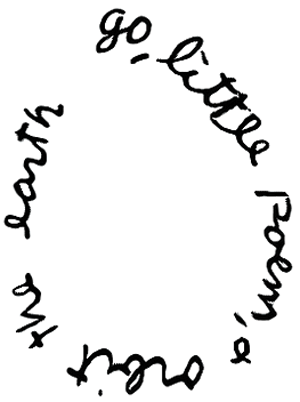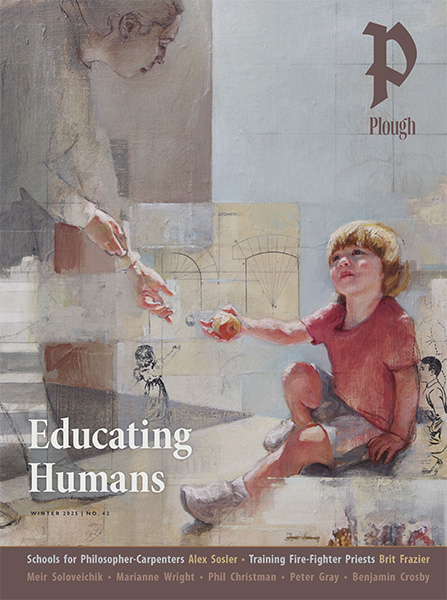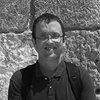Subtotal: $
Checkout-

Editors’ Picks Issue 7
-

Rediscovering Wonder
-

Educating for the Kingdom
-

Being Obedient to Christ
-

Learning from Sister Charis
-

Coward, Take My Coward’s Hand
-

Mother Maria of Paris
-

The Good Samaritan
-

Readers Respond: Issue 7
-

Family and Friends: Celebrating Marriage
-

The Gospel at the Margins
-

Our Daily Bread
-

Forgiving Kim Jong-Il
-

Poem: Twilight
-

Snapshots from Lesbos
-

Family and Friends Issue 7
-

The Courage to Forgive
-

Insights on Mercy
-

Forgiving the Unforgivable?
-

Forgiving Dr. Mengele
-

The God Who Descends
-

The Weapons of Grace
-

Restorative Justice

Next Article:
Explore Other Articles:
The New York Times praised his 1959 work Circus of the Sun as “perhaps the greatest English-language poem of this century.” A reckless claim, perhaps, yet still today the minimalist poet Robert Lax (1915–2000) has his devotees, especially among fans of Thomas Merton, with whom he shared a lifelong friendship. Because of the hidden quality of his life, however, he is not as widely known as his contemporaries and friends such as Jack Kerouac or Merton himself.
With any luck, Michael McGregor’s compelling new biography will help change that. In telling Lax’s story, he’s been aided by the subject himself, who kept voluminous journals throughout his life, sometimes writing thirty to forty pages a day. Using these entries, McGregor recreates conversations and scenes that are as vivid as a screenplay.
Lax’s work and life, McGregor argues, can best be understood in terms of what he, borrowing from Aquinas, called “pure act” – a life of simplicity, poverty, and joy, lived completely in the moment. In the words of one of Lax’s poems, quoted by McGregor as a kind of manifesto:
there are not many songs
there is only one song
the animals lope to it
the fish swim to it
the sun circles to it
the stars rise
the snow falls
the grass grows
there is no end to the song and no beginning
the singer may die
but the song is forever
truth is the name of the song
and the song is truth.
Born to a New York Jewish family, Lax first met Merton at Columbia University, where both worked at the Jester, a student humor magazine. Both would go on to join the staff of the Columbia Review, with Lax as editor-in-chief. In the evenings, he and Merton would go listen to jazz musicians, and Lax later remembered the musicians’ free yet unified playing as his first experience of “pure act.”
The year 1943 marked a decisive turn: Lax followed Merton’s lead and converted to Catholicism – a decision inspired in part by reading Catholic writers such as Aquinas, Dante, and (not least) James Joyce, whose run-on style he imitated in his journals. According to Ed Rice, who served as godfather to both new converts, Lax “was born a Catholic and finally got baptized,” unlike Merton, who “really had to struggle with it.” Though Merton’s entry into the Trappist order meant an outward separation, the two corresponded faithfully.
As an aspiring writer, Lax initially met only discouragement, flitting from one job to the next, first on the staff of the New Yorker and then as Time’s poetry editor. Though often despondent over his failure to find a publisher, he worried about the danger of “committing suicide” as a poet by abandoning his voice in order to find a readership. Through this search for genuineness, he met the Cristiani family, who owned a circus, and spent months traveling with them. To Lax, the artistry of the circus reflected the creativity of God, the maker of the universe and master of history. These experiences served as material for Circus of the Sun, his best-known book, which portrays all life as taking place under a heavenly gaze:
Who is it for whom we now perform,
Cavorting on wire:
For whom does the boy
Climbing the ladder
Balance and whirl –
For whom,
Seen or unseen
In a shield of light?
The beginning of the 1950s found Lax in Marseilles. Life in southern France was a revelation, a manifestation of the same genuine “pure act” that he had seen in the Cristiani circus: “The great thing in Marseille is not the buildings; it is the people . . . All who live here walk the decks of their city with grace and equilibrium, the joy of acrobats and sailors.” He would spend much of the next two years in France, working in Paris at a literary magazine alongside Jack Kerouac, whose work he came to champion.
Already a subscriber? Sign in
Try 3 months of unlimited access. Start your FREE TRIAL today. Cancel anytime.
Lax’s search for a place to live that was quiet, warm, and cheap led him in November 1968 to the Greek island of Kalymnos (he’d already been living in Greece off and on since 1961). Soon after arriving, he received a letter from Merton proposing a reunion – the first for the two friends in years. They planned to meet on the top of Mount Athos, the “Holy Mountain” of Eastern Orthodox monasticism. It was not to be. On December 11, Lax received a telegram informing him that Merton had been electrocuted by a badly wired appliance while attending a conference in Bangkok.
Shocked by his friend’s death, Lax retreated into a life of quiet: “Thinking somehow day and night about him . . . Glad to be here where every part of the landscape makes sense.” He determined to stay on Kalymnos, retreating to Patmos during seasons when tourists swarmed the larger island.
Paradoxically, it was in these years that Lax’s work finally began to receive international attention. The BBC broadcast a forty-minute reading of his poems, and several notable writers including British critic R. C. Kenedy published appreciative studies. For Lax, such recognition, so long withheld, was immensely gratifying.
Patmos, the island on which John wrote the Book of Revelation, is where McGregor met Lax in 1985. Lax understood the younger man’s quest for a genuine way of living, and McGregor in turn was deeply impressed by the poet’s quiet simplicity and joy. This biography is a sensitive testimony to their subsequent fifteen years of friendship, and to the “pure act” that Lax knew to be at the heart of life as God intended it.
Photograph by Nancy Goldring. Used by permission.
 Untitled poem in Robert Lax’s Journal C (Pendo, 1990)
Untitled poem in Robert Lax’s Journal C (Pendo, 1990)
Already a subscriber? Sign in
Try 3 months of unlimited access. Start your FREE TRIAL today. Cancel anytime.




































Hiral Brar
This is very nice story